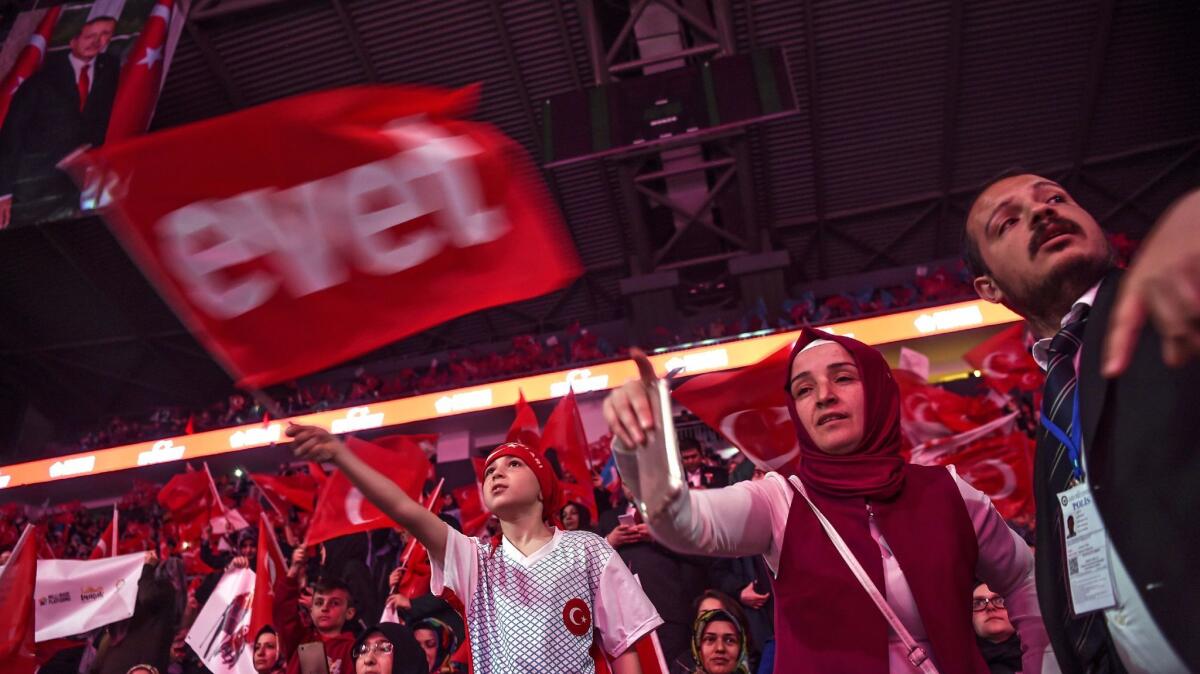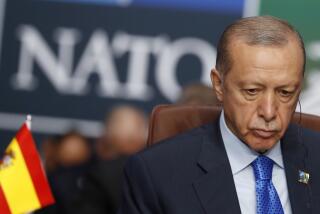Some Turks fear the rise of a dictatorship as a referendum nears to greatly expand Erdogan’s powers

- Share via
Reporting from Eskisehir, Turkey — As Turks prepare to vote in a referendum that would greatly expand the powers of President Recep Tayyip Erdogan, the advocates of the change are brimming with confidence while opponents say they don’t know how to prevent the advent of one-man rule.
The package of 18 constitutional amendments up for a vote Sunday would replace parliamentary democracy with a “presidential government” that puts most of the levers of power in Erdogan’s hands. Lawmakers would have little influence on key decisions, and the judiciary would be even more subservient than it is currently.
And Erdogan, already in power for 15 years, would be able to run for two more five-year terms when his current term ends in 2019.
Eskisehir, an industrial city of 800,000, is located in central Anatolia, the heartland for Erdogan’s ruling Justice and Development Party (AKP), but it’s controlled by the opposition Republican People’s Party (CHP). There’s been a spirited, yet civil, debate here, judging from the booths set up by “yes” and “no” backers in the city center, some next to each other.
But in a cafe near the university, the mood was somber this week as opponents of the changes explained why they were sitting around tables playing Rummikub, a Turkish board game, rather than campaigning door-to-door for their cause.
A lot has to do with the fact Erdogan scheduled the referendum during a state of emergency dating from last July’s abortive military coup that Erdogan blames on a Muslim cleric in U.S. exile.
There is a psychological problem. People believe no matter whether they vote ‘yes’ or ‘no’, that ‘yes’ will win.
— Utko Cakirozer, parliament member
“Everyone is scared,” said a student who asked to be identified only as Ismet, 23. “If we went out on the streets, we’d wind up in prison.” He said he can’t even post his views on Facebook, fearing the authorities would come down hard on his family.
But he also blamed the opposition organizers. Even among referendum opponents, Erdogan is seen as a “real leader” compared to Kemal Kilicdaroglu, the CHP leader.
“We are talking to the ‘yes’ people and trying to persuade them,” said Yunus, 33, who also feared reprisal if he gave his full name. But he added that CHP leadership should be “much more active, much more effective.”
The two men and two young women, all medical students, agreed that Turkey is on the eve of a dictatorship, with no checks and balances on executive power. They said it could be like Germany in 1933, when Adolf Hitler rose to power, but they said they didn’t know what they could do about it.
Utko Cakirozer, a former editor of the opposition daily Cumhuriyet, who’s now one of six parliament members from Eskisehir, had gone to the “In Heavy Demand” coffee house to cheer on the “no” campaign. (Cakirozer was a Daniel Pearl fellow at the Los Angeles Times in 2008.)
“There is a psychological problem,” he said in an interview. “People believe no matter whether they vote ‘yes’ or ‘no’, that ‘yes’ will win.”
He said he tries to counter that resignation by saying that the government won’t be able to steal the vote if observers and the public keep a close watch on the ballot boxes.
But there’s nothing he can do about the wide sense of intimidation that followed the government’s firing of more than 110,000 civil servants and the jailing of more than 50,000 for allegedly supporting the putsch.
The opponents also had no way to counter Erdogan’s severe clampdown on the news media, the arrests of journalists and the closing of dozens of news outlets following the coup attempt.
The “no” backers had no way to stop Erdogan from taking full advantage of the state apparatus as he campaigned for the amendments, invariably receiving more TV news coverage than Kilicdaroglu and other “no” campaigners.
Nor could they match Erdogan’s skill in capitalizing on the country’s woes, which include a revival of the insurgency by the Kurdistan Worker’s Party separatists in southeastern Turkey and the threat Islamic State extremists based in neighboring Syria.
Yet whatever complaints the CHP may have about the government using the state of emergency to block access to the media and the general public, it pales in comparison to Erdogan’s crackdown on the mainly Kurdish People’s Democratic Party, whose parliamentary leadership have been detained on charges of supporting the Kurdish separatists, widely known as the PKK.
City and town officials belonging to the Kurdish People’s Democratic Party have been ousted from their positions and hundreds of its local leaders have been detained, the party said April 7. Rallies have been banned, the party cannot put up posters showing its leaders now in jail and it cannot even play its campaign song, party officials said.
In a day packed with appearances and interviews to rally support for the “no” vote, Cakirozer also made a low-key visit to a textile factory, where he greeted workers in the cafeteria.
“I am afraid if [Erdogan] wins there will be a dictatorship,” said Nurten Gunes, 24, a recent graduate in international relations, who’s working on the production line pending her admission to a graduate degree program. She said her friends felt they were under pressure to vote “yes” in order to keep their jobs.
Other employees seemed well aware of what was at stake in the referendum and that the eyes of the world are now on Turkey.
“All the world wants ‘no’ to win, so the people around me say that we have to say ‘yes,’” said Nebahat Toraman, 43, another worker.
The vote is indeed being watched closely from abroad. Turkey, a country of some 80 million that connects Europe with Asia and a critical U.S. ally in NATO, borders some of the world’s most unstable places, starting with Syria and Iraq.
Nearly every Western partner has expressed deep reservations about the proposed constitutional changes, but most have stayed silent so as not to provide a foil for Erdogan’s “yes” campaign. The Trump administration, which has allied with the PKK’s Syrian affiliate in the battle against Islamic State extremists in Syria, has delayed its decision on a military plan to capture Raqqa, the self-declared Islamic State capital, until after the referendum.
The outcome Sunday is unclear, with some polls showing the country divided, and the main uncertainty is whether voters are telling the pollsters their true intentions Sunday or whether they’ve made up their minds.
Gutman is a special correspondent.
ALSO
‘Take Ahmed and let me die’: Victims of U.S. airstrike in Mosul recount a day of horror
More to Read
Sign up for Essential California
The most important California stories and recommendations in your inbox every morning.
You may occasionally receive promotional content from the Los Angeles Times.










